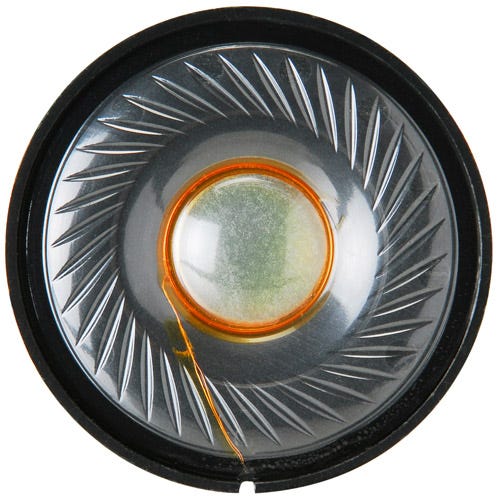No!
Neither do most of the things printed on a specs list on headphone boxes. You learn more by wearing and listening to the headphones.
Next Question!
Okay okay fine. Let’s go a little deeper.

This is a dynamic headphone driver. It’s a thin thing that vibrates back and forth in response to an electrical current.
The vibration creates sound waves that go into your ears.
Dynamic drivers are the most common type of headphone and speaker driver. They’re the cheapest to make…but that doesn’t mean they’re made of cheap materials. They’re made of all kinds of stuff, actually. Sony even has some that are coated in titanium! Fancy!
Some companies like to advertise how big their drivers are, usually in millimeters…but this doesn’t actually say a great deal about the sound. A larger dynamic driver is going to be able to move a little bit more air…but you don’t need to move a whole lot of air in a pair of headphones to make them go.
Think about how tiny your ear holes are.
Think about how tiny Apple’s Ear Pods, or other ear buds are.
Those have teeny tiny drivers in them, yet they can still make a ton of sound.
At some point, if you move too much air into your ear, you’re just going to blow up your hearing.
So if driver size isn’t important, what is?
The materials used are important, and the tuning of the driver and its enclosure are important.
You want good flexible material that isn’t going to break at modest or high power levels. Most well-reviewed headphones these days use decent quality driver material. Cheaper ones might distort or break under load, so that’s one reason to spend a little extra on headphones. I don’t ever play my headphones at really loud volumes, and I’ve never blown out a driver even on cheaper models.
Tuning, enclosure design, and ear padding are everything when it comes to how drivers sound.
Consider the following example.
Audio-Technica makes two popular headphone models: The M50X and the M40X. The 50 uses 45mm drivers, and the 40 uses 40mm drivers. So you’d assume the 50X is better, since it uses bigger drivers, right?
Not necessarily!
Both headphones are tuned very differently. The M50X has enclosures, pads, and tuning designed for a slightly aggressive sculpted response. The M40X is designed around a flatter, more neutral signature. In both cases, the enclosure of the cup and the type of padding used effect the sound way more than the size of the driver itself.
I’m not saying that driver size has no impact on sound quality. But it’s not a very useful thing to tell the end-user. Heck, knowing the driver size is even less useful than the claimed frequency response range that’s so often printed on headphone boxes.
Driver size is a fun factoid to know, and I guess it’s something you can throw out there to try and win a dumb audio argument.
But it’s all about the tuning.
You ever seen a reviewer say they changed the pads on a pair of headphones and it ruined the sound quality?
That’s thanks to the tuning.
You can’t fully know if a headphone is right for you until you’ve tried it out for yourself, no matter how many specs they throw at you on the box!
